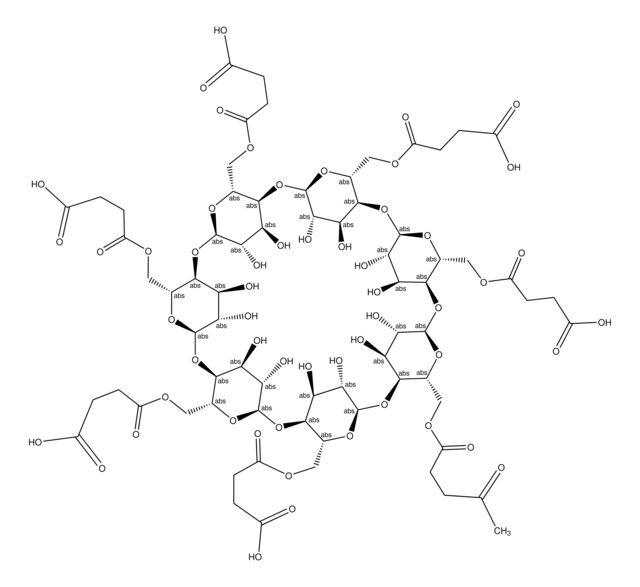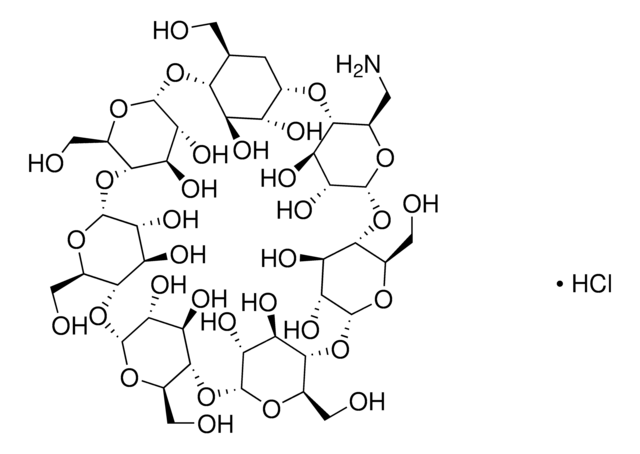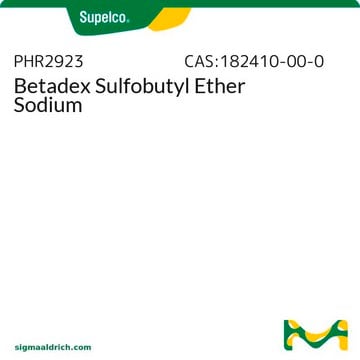21906
Carboxymethyl-β-cyclodextrin sodium salt
Synonyme(s) :
Sodium CM-β-Cyclodextrin
About This Item
Produits recommandés
Forme
solid
Niveau de qualité
Impuretés
10% water
Pf
~245 °C (dec.)
Solubilité
H2O: 50 mg/mL, clear to slightly hazy, colorless
Chaîne SMILES
O[C@H]1[C@H](O)[C@@H]2O[C@H]3O[C@H](COCC(O)=O)[C@@H](O[C@H]4O[C@H](COCC(O)=O)[C@@H](O[C@H]5O[C@H](COCC(O)=O)[C@@H](O[C@H]6O[C@H](COCC(O)=O)[C@@H](O[C@H]7O[C@H](COCC(O)=O)[C@@H](O[C@H]8O[C@H](COCC(O)=O)[C@@H](O[C@H]1O[C@@H]2COCC(O)=O)[C@@H](O)[C@@H]8O)[C@@H](O)[C@@H]7O)[C@@H](O)[C@@H]6O)[C@@H](O)[C@@H]5O)[C@@H](O)[C@@H]4O)[C@@H](O)[C@@H]3O
InChI
1S/C56H84O49/c57-22(58)8-85-1-15-43-29(71)36(78)50(92-15)100-44-16(2-86-9-23(59)60)94-52(38(80)31(44)73)102-46-18(4-88-11-25(63)64)96-54(40(82)33(46)75)104-48-20(6-90-13-27(67)68)98-56(42(84)35(48)77)105-49-21(7-91-14-28(69)70)97-55(41(83)34(49)76)103-47-19(5-89-12-26(65)66)95-53(39(81)32(47)74)101-45-17(3-87-10-24(61)62)93-51(99-43)37(79)30(45)72/h15-21,29-56,71-84H,1-14H2,(H,57,58)(H,59,60)(H,61,62)(H,63,64)(H,65,66)(H,67,68)(H,69,70)/t15-,16-,17-,18-,19-,20-,21-,29+,30+,31+,32+,33+,34+,35+,36+,37+,38+,39+,40+,41+,42+,43-,44-,45-,46-,47-,48-,49-,50-,51-,52-,53-,54-,55-,56-/m1/s1
Clé InChI
WROHVVIPQXODQM-LYSKQWNXSA-N
Description générale
Application
Carboxymethyl-β-cyclodextrin (CMBCD) is used in the development of recognition and separation technologies to resolve enantiomers based on chiral properties and size. Carboxymethyl-β-cyclodextrin is used in chiral selection and separation by capillary electrophoresis. Carboxymethyl-β-cyclodextrin is used in the development of drug delivery vehicles such as nanocarriers and as a nucleic acid transfection agent.
Remarque sur l'analyse
Autres remarques
Code de la classe de stockage
11 - Combustible Solids
Classe de danger pour l'eau (WGK)
WGK 3
Point d'éclair (°F)
Not applicable
Point d'éclair (°C)
Not applicable
Équipement de protection individuelle
Eyeshields, Gloves, type N95 (US)
Certificats d'analyse (COA)
Recherchez un Certificats d'analyse (COA) en saisissant le numéro de lot du produit. Les numéros de lot figurent sur l'étiquette du produit après les mots "Lot" ou "Batch".
Déjà en possession de ce produit ?
Retrouvez la documentation relative aux produits que vous avez récemment achetés dans la Bibliothèque de documents.
Notre équipe de scientifiques dispose d'une expérience dans tous les secteurs de la recherche, notamment en sciences de la vie, science des matériaux, synthèse chimique, chromatographie, analyse et dans de nombreux autres domaines..
Contacter notre Service technique








